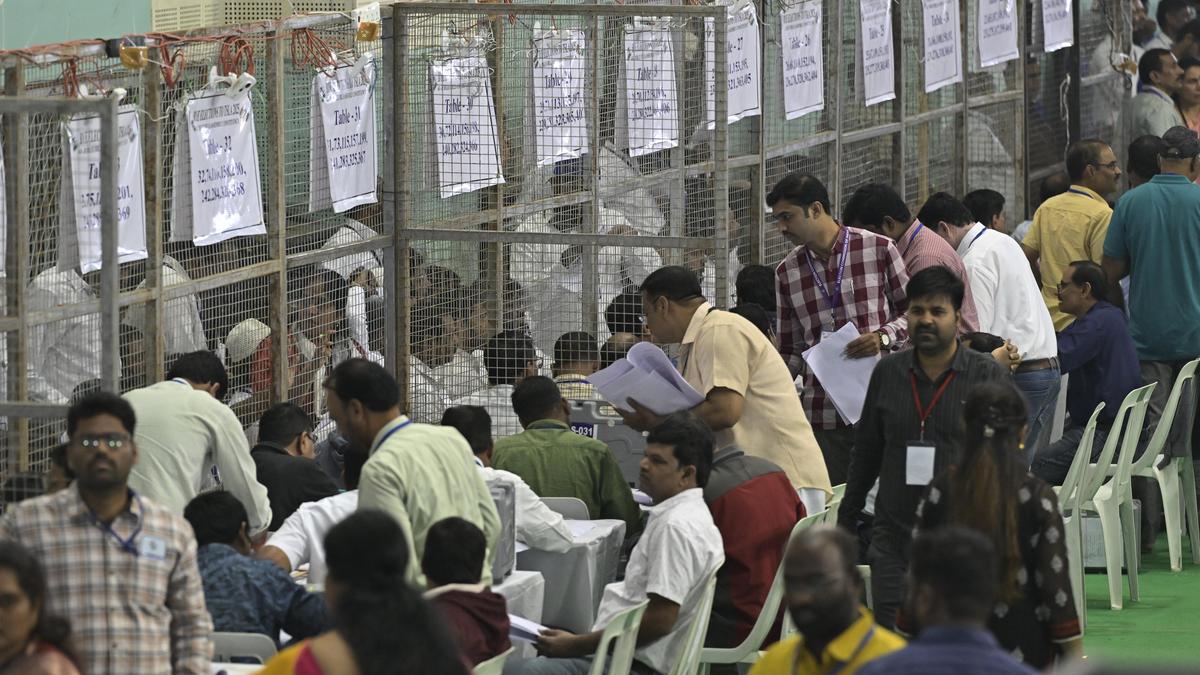HYDERABAD, India – The political landscape of Telangana is experiencing tremors following the Jubilee Hills by-election, a contest that has transcended local significance to become a critical litmus test for India’s major political parties. The air in Hyderabad was thick with anticipation on Friday, November 14, 2025, as vote counting commenced, promising a drama that would grip the nation. What began as a routine electoral exercise quickly escalated into a nail-biting spectacle, culminating in a razor-thin lead for the Congress candidate, sparking widespread debate and analysis.
The Stage is Set: A City Holds Its Breath
The by-election for the Jubilee Hills Assembly constituency wasn’t just another poll; it was framed as a battleground where the electoral fortunes of the ruling Congress, the formidable Bharat Rashtra Samithi (BRS), and the ambitious Bharatiya Janata Party (BJP) would be keenly scrutinized. The stakes were extraordinarily high. For Congress, a victory would solidify its recent resurgence and provide crucial momentum. For BRS, a former dominant force, it was an opportunity to demonstrate continued relevance and resilience in the face of recent setbacks. And for BJP, it was a chance to expand its footprint in a strategically important southern state.
The constituency itself, Jubilee Hills, is a microcosm of Hyderabad’s diverse socio-economic fabric, encompassing both affluent areas and densely populated neighborhoods. This blend makes it a fascinating electoral puzzle, often reflecting broader trends in urban voter sentiment. The election campaign was intense, marked by rallies, door-to-door canvassing, and a fierce war of words between the contenders, each promising development and stability, while subtly (or not so subtly) attacking their rivals.
The Counting Room Chaos: Every Vote a Battle
As the clock struck 8 a.m. at the Kotla Vijay Bhaskar Reddy Stadium in Yousufguda, Hyderabad, the scene was one of controlled chaos. Amidst tight security, election officials began the painstaking process of opening postal ballots, followed by the electronic voting machines (EVMs). Reports from inside the counting center painted a picture of palpable tension, with party agents and media personnel glued to every update.
“The initial rounds were absolutely nerve-wracking. Every single vote felt like a decisive blow in a heavyweight boxing match. When the news of Congress leading by just 47 votes in Round 1 broke, you could feel the collective gasp. It wasn’t just a number; it was a psychological punch that reset expectations for every party involved,” an anonymous election observer remarked, highlighting the immediate impact of the close margin.
The election commission had meticulously planned for 10 rounds of counting across 42 tables, a process designed to ensure transparency and accuracy, but also indicative of the sheer volume of votes to be tallied. The early lead by the Congress candidate, though minuscule, sent ripples of excitement through their camp and a wave of apprehension across the BRS and BJP factions. It instantly signaled that this by-election would go down to the wire, embodying the very essence of democratic contestation where every ballot truly matters.
A Microcosm of National Tensions
Beyond the local dynamics, the Jubilee Hills by-election carries significant weight for the national political narrative. Hyderabad, as a major metropolitan hub, often serves as a bellwether for urban intellectual and professional voter sentiment. The results here are not just about who wins the seat, but what they symbolize for the larger political currents sweeping across India.
For the Congress, this marginal lead, if it holds, is a vital affirmation of its strategy to regain lost ground in southern states. After a period of relative decline, the party has shown signs of revival, and a win in Jubilee Hills would be touted as proof of concept, inspiring cadres and potentially shifting alliances in future state and national elections. It would be a strong counter-narrative to the prevailing dominance of the BJP at the national level, suggesting a multi-polar political future.
Who Stands to Gain, Who Stands to Lose?
- Congress: Even a narrow victory is a psychological triumph. It validates their organizational efforts and appeals to local issues, potentially paving the way for further inroads into urban constituencies.
- BRS: A loss, especially a close one, would force the BRS into deep introspection. Once the undisputed regional hegemon, they face the challenge of adapting to a more competitive landscape. It might compel them to recalibrate their strategies, focusing more intensely on grassroots mobilization and addressing anti-incumbency sentiments.
- BJP: Despite not leading, a strong showing and a competitive vote share for the BJP would still be seen as incremental progress. Their ambition to establish a strong presence in Telangana means that every election, win or lose, offers valuable data and an opportunity to refine their long-term growth strategy. They will likely analyze their performance in specific polling booths to identify areas for future focus.
The ‘litmus test’ moniker attached to this by-election proved accurate. It tested the electoral machinery of all parties, their ability to mobilize voters, and the efficacy of their campaign messaging. The outcome, whatever the final margin, will undoubtedly shape political narratives for months to come, influencing party manifestos, candidate selections, and even pre-poll alliance discussions for the upcoming general elections.
The Future Echoes of Jubilee Hills
The political implications extend far beyond the immediate electoral victory. A Congress win, however slim, could embolden opposition parties nationwide, suggesting that the BJP’s electoral dominance is not insurmountable, especially in regional contests. It might lead to renewed efforts for a united opposition front, leveraging regional successes to build national momentum. Conversely, if the lead were to flip, or the final margin for Congress to be incredibly tight, it would underscore the persistent challenges faced by the party in consolidating its gains and converting momentum into decisive victories.
“Jubilee Hills is more than just a seat; it’s a political barometer. The close fight signals a highly fractured electorate, where no single party can take its support base for granted. Every by-election now serves as a crucial feedback mechanism for political parties to adjust their sails in the ever-changing winds of Indian democracy,” observed Dr. Meera Sharma, a prominent political analyst.
The meticulous counting process, the vigilance of party agents, and the razor-thin margin all serve as a powerful reminder of the robustness of India’s democratic institutions, even amidst intense political rivalry. It highlights the importance of every vote, every booth, and every round of counting in shaping the destiny of constituencies and, by extension, the broader political narrative of the nation. The Jubilee Hills by-election is a testament to the fact that in Indian democracy, the final chapter is never truly written until the very last ballot has been counted, ensuring a captivating and unpredictable journey for all stakeholders.


